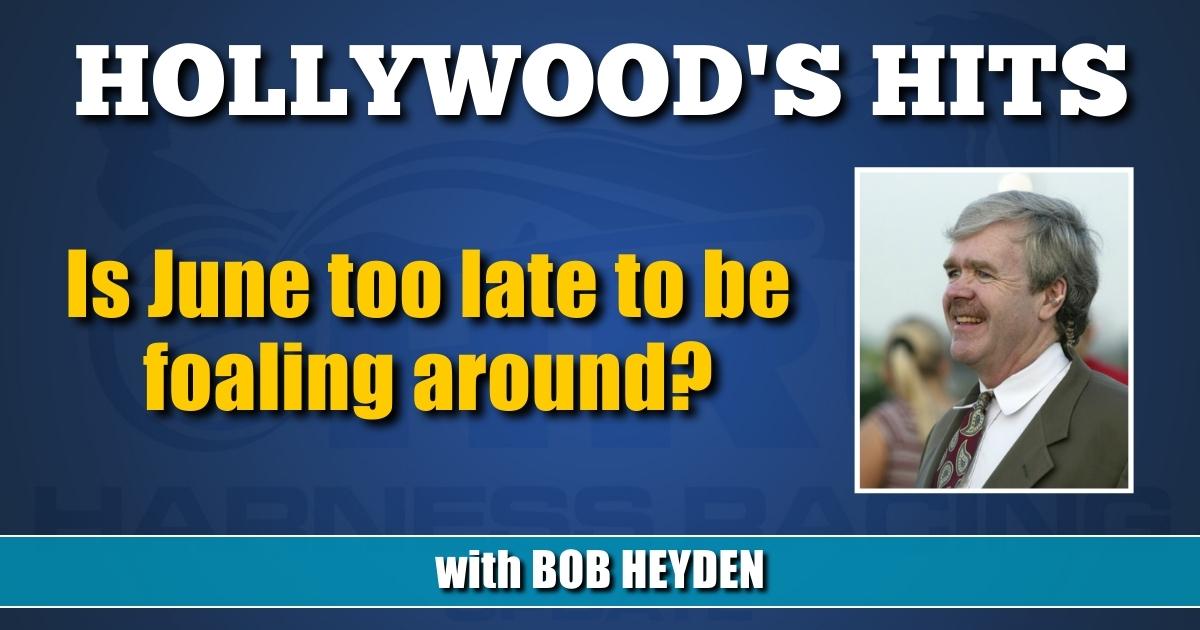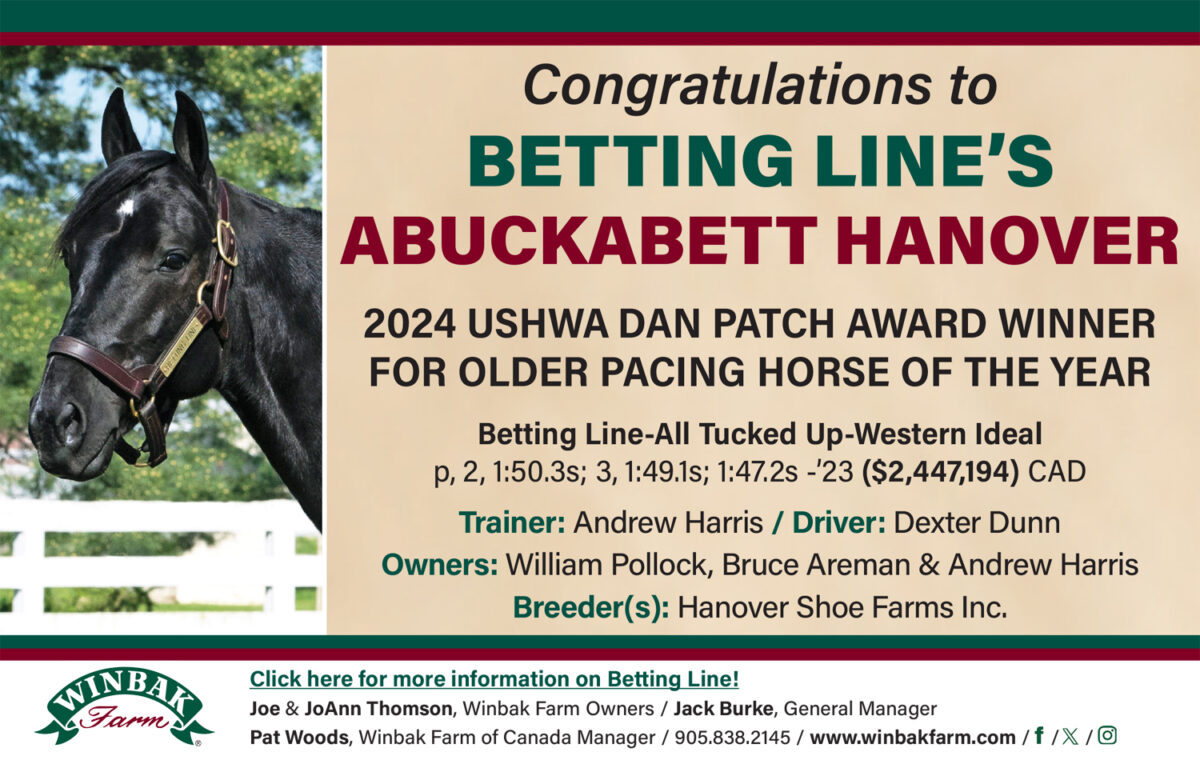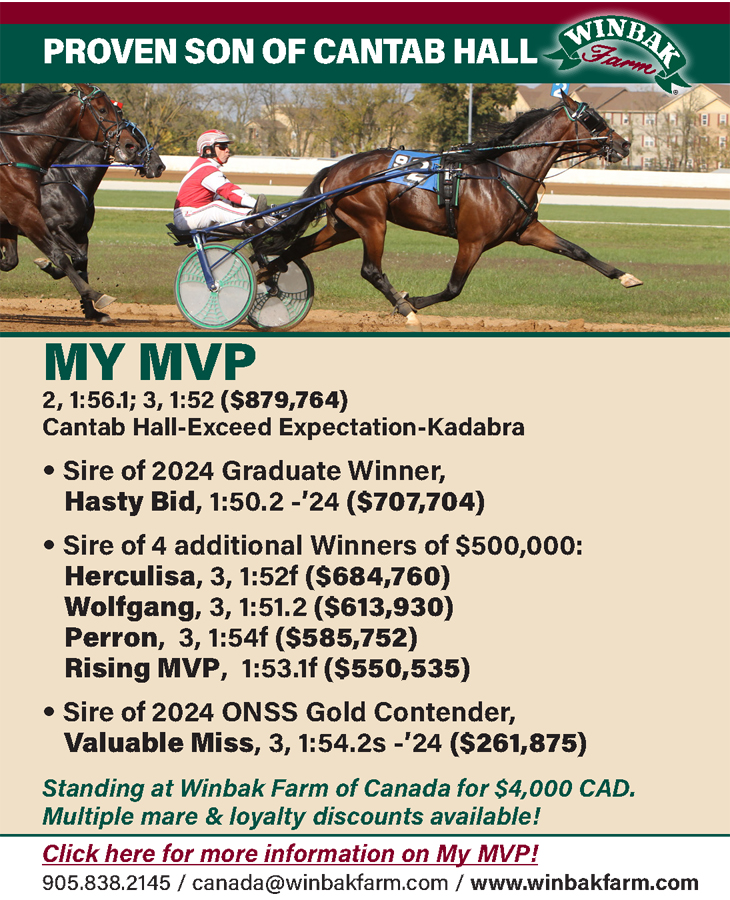
Is June too late to be foaling around?
by Bob Heyden
The sires of three of the last five Horses of the Year — McArdle (McWicked, 2018), Art Major (Test Of Faith, 2021) and Shadow Play (Bulldog Hanover, 2022) — were June foals.
Harmonious was a June foal who won the 1990 Hambletonian, at the time the richest edition.
Life Source was a near $2 million winner a quarter century ago and a June foal.
There have been 46 editions of the Meadowlands Pace and the fastest one belongs to a June foal, He’s Watching, 1:46.4 in 2014.
Die Laughing, a June foal, got his nose in front in the very last $1 million Woodrow Wilson in 1990.
How do some prominent people in our business feel about June foals?
Blair Burgess: “They rarely can compete early but there are exceptions like Die Laughing. As Murray Brown would retort: ‘The percentage of June foals born is much less than the other months because breeders do all they can to avoid it knowing they will be killed come sale time.’
“I don’t necessarily prefer early or late foals and have had good ones born in most months, I think. Early foals are more mature but later foals get outside more because of the better weather. Advantages at both ends of the spectrum. Most stud books close down late June to avoid the June foals. Even that planning can go awry as mares can easily carry 3 to 4 weeks over due date. So much pressure is put on 2-year-olds to show up now, a June foal would be at a distinct disadvantage. Unless in the hands of a conservative trainer/owner.”
Pat Lachance: “I like them but you need to have a lot of patience and discipline.”
John Kopas: “Back in the mid-1970s, Jade Prince was a late December foal. At that time Delvin [Miller] thought that the breeding season should start in January and that foals born in December would be considered as being foals of the following calendar year. I’m not sure how long that remained in place.”
Scott DiDomenico: “A good horse is a good horse. January or June foal, it wouldn’t bother me at all.”
Steve Katz: “A late foal is better than no foal.”
Jack Darling: “It’s not ideal, but I would buy an early June foal if I really liked it. I like May foals a lot.”
Travis Alexander: “I try to avoid them for the simple reason they aren’t as mature as others. Doesn’t mean they aren’t fast, but from a bone standpoint I stay away.”
Bob Boni: “June foals are okay with me, absolutely. Pershing Square was a June foal and I know there are a number of other quality performers who were also like Die Laughing and Bullet Hanover. I would even think that based on fewer foals born in June there is an excellent percentage of accomplishment. Considering there are certainly less foals born in June the percentage of top horses may be higher than any other month.”
Paul Kelley: “I’m biased against for the obvious reasons.”
Bruce Riegle: “No. They would have to be a special colt and start late and then you are always playing catch-up.”
Kim Hankins: “Obviously June foals are a few months younger than earlier foals, and sometimes more immature. But I don’t have any statistics to back up my theories.”
Carter Pinske: “No problem with them. Sometimes they force you to be easier on them because they’re immature and, in the end, they end up better because of it. I’ve had several nice June foals that didn’t get treated any differently.”
Brian Brown: “Rather not have them, but I’ve had two that I can think of. One set a world record here in Delaware, Ohio. Sometimes you can buy a nice horse cheaper because he’s a June foal.”
Seth Rosenfeld: “Of course, each individual is different, but I think they’re often excellent value for yearling buyers willing to show a bit of patience. There’s quite a long list of successful ones like: Die Laughing, Shadow Play, Art Major, McArdle, Harmonious, David’s Pass. Unless you have an unlimited budget, as a yearling buyer you are going to have to compromise somewhere to get a somewhat affordable prospect. So, if the market offers a discount on June foals, as it often does, that’s an advantage for the buyer and a disadvantage for the seller.”
Roger Welch: “June foals, they are definitely starting out behind physically and also mentally. They are usually the results of their breeder not wanting to feed a barren mare another season. Then the greed bites them in the rear end at the sales when the buyers shy away from a June foal. If you are not looking for an early season to mid-fall stakes colt at the sales, there’s definitely some bargain buys that will suit a buyer — with a no-pressure trainer — just because it says June on the foaling date.”
Dr. Ian Moore: “A June foal will not deter me if I really like the individual. I always look at the foaling date, and if it says June, I will look at the yearling’s development differently. [Shadow Play] was immature at 2, but towards the end of the season he got really good. I was considering selling him at that point. But he trained in 1:54 off a half in 1:00, and then 1:54 again off a 1:01 half. I decided I might want to take a chance with him. Early on [at 2] I had to put an open bridle on him in February because he was so grabby. He came back thicker and taller at 3.
“As a stallion, we were hoping it would turn out well. He had a lot of characteristics that I look for in a yearling that I hoped he would pass on. He never got the kind of book that SBSW did, but he did quite well. Most of his have a great attitude. As a matter of fact, this is the only year that I do not have a Shadow Play. There were 22-to-23 offered for public sale last year and I just couldn’t find one. So, I settled for a couple out of Shadow Play mares.
“I have nine colts this year, four PA eligible, one Ohio eligible and even a colt by The Panderosa. When you mention June foals, the one that stands out so far is a June 5 foal. So, go figure. As a vet, May/June is the natural time of year to foal. The breeders were the ones who pushed that back some years ago.”













